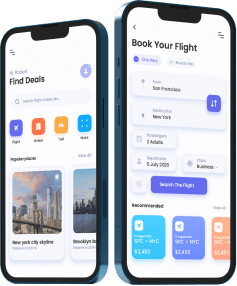Suppose applications for mobile devices have been characterized, in general terms, by a remarkable quality in terms of design, performance, capacity, and functionalities. In that case, cross-platforms have a great added advantage because they can be used on any smartphone or tablet, regardless of the operating system.
The implementation of cross-platform applications will bring a series of advantages to your business's development that should not be overlooked. Among other things, you can save time and volume of work dedicated to your projects because the design and development of a cross-platform app can be carried out simultaneously for different devices, turning their development into a more flexible and efficient process.
Using Cross-platform development, it is possible to solve malfunctions or update the functionalities and content parallel to all platforms, thus saving a good part of your time.
Likewise, with a cross-platform application, you can target the entire app market worldwide, being able to develop this type of tool for emerging platforms simply and effectively. By being present on a large number of devices, the marketing campaigns that you plan to undertake will reach a broader audience.
Focusing all efforts on targeting your projects to a single operating system might not have the same effect as a multi-device or cross-platform release. For this reason, you can reach a significant percentage of users due to a large number of currently existing devices and platforms (iOS and Android).
Hire Top Cross-platform Developers
Creating a mobile app that works on all devices irrespective of their operating system is an exciting option for business owners. This offers a whole lot of benefits. Hyperlink InfoSystem is a leading mobile app development agency, and we create highly efficient mobile applications using various technologies. We follow every platform's guidelines and are always ready to assist you with cross-platform mobile app development.
Our Cross-Platform Development Tools At Hyperlink InfoSystem
Due to the variety of platforms and devices that determine the mobile market, cross-platform app development has proven to be the most economically viable solution. In contrast to native app development, code that was generated with a cross-platform development tool can be used for various platforms and devices. In this way, app programming with a cross-platform tool not only curbs programming costs, but also saves you the hassle of updating and managing your apps. Some of the tools we use are:
Xamarin
In Xamarin, the C# code base can be universally applied to multiple platforms. Nevertheless, in contrast to other frameworks, the tool allows developers to work with native IDEs, languages and APIs. In addition, the Git integration is an integral part of Xamarin Studio.
PhoneGap
Developed by the team behind Apache Cordova, this open source tool is equipped with a compiler, debugger and testing tools that are tightly interwoven with popular web technologies such as HTML, CSS3 and JavaScript. The rumors that PhoneGap is only suitable for simple apps and that PhoneGap apps hardly exploit the capabilities of the device have recently been proved wrong by the integration of a large selection of plugins such as the Image Capture Plugin, the Media Recorder Plugin, the Push Plugin and various others, cleared.
React Native
This open source platform uses a native user interface for Android and iOS based on Angular, TypeScript or JavaScript. Developers get access to native APIs via JavaScript and can recycle NPM, CocoaPods and Gradle packages. In this way they can develop feature-rich apps or improve existing features of apps.
Monocross
MonoCross supports the cross-platform development of apps with the help of C#, Microsoft .NET and the Mono Framework. Developers can secure the application, controller and model code across platforms while playing with the platform container and the view that represents the user interface to deliver a native experience across all key platforms. The tool also makes app porting easier than ever. In this way, companies can better cope with the rapid changes in platforms.
Kony App Platform
The low-code app development framework Kony App Platform is the right choice for companies that want to cope with the increasing demand for mobile applications in their home. Developers with JavaScript skills can use the platform to create both native and cross-platform apps. The biggest advantage of Kony App Platform is that developers can easily drag and drop the features they need from Kony Marketplace or the associated API library. Developers can rate the app and validate its API connectivity. In this way, the framework speeds up the development process.



